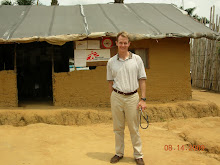
We all know that women are treated differently than men in this world. As a man, this usually slips by me unnoticed. People treat me a certain way so I assume everyone is treated equally. This morning, however, the difference struck me especially hard.
In order to keep myself from getting too fat, I’ve been exercising. Once a week I swim at Lac Vert. The remainder of the time I’ve been running. Two or three days per week, my alarm rings at 5:45 a.m., just before sunrise. I pull on a t-shirt, running shorts, and shoes. By the time I stumble outside, it is light. The guardians at Couvent sleepily say “Bonjour”, open the gate, and I’m off.
I cross in front of the main church in town and turn left onto a narrow path. It winds through a neighborhood of square mud houses with leaf roofs and bamboo fences. I’ve taught the children on the route my name and that I am working with MSF; they scream these words to me, mixed with “bonjour”s and ask how I am feeling. I run by, wave, smile, and try not to trip on the uneven dirt path.

Finally, I emerge on the road leading to Kindu (photo). It is dirt and gravel, brick red, and very hilly.
On my way out, there are few people awake and I concentrate on running. It is hot and humid and feels like New Orleans on a summer’s morning. Some days the mist is so heavy that I stop to wipe my glasses several times and I return home with wet hair. Eventually I get to turn around and head home. By now, the people living on the route are awake and outside. When I first began running there were a few stares, but that’s now stopped. People appear to have grown accustomed to the early morning sighting of a sweating, panting American trying to avoid middle aged spread. The trip home is filled with smiling, waving, and saying “bonjour.”
Two weeks ago another American joined the ex-pat team in Lubutu. Terra is a family practice doctor and works in the hospital. She’s forty, fun, and fit. Terra has been joining me on my runs and I love her company. We talk about our lives while trying to avoid brakeless bicycles hurtling down the steep hills. Terra is a good looking woman and in great physical condition. When I began exercising with her, my run changed. At first I couldn’t pinpoint the origin of this difference, other than I had someone to talk to. Now, in retrospect, I realize I wasn’t hearing as many “bonjour”s.
I didn’t figure it out why until this morning. We had a new arrival to the team yesterday. Jana, a Norwegian anaesthetist, joined the team. Like Terra she is good looking and physically fit. This morning Jana joined us on our jog out Axe Kindu. On the way home I ran a few meters behind the two of them. Compared to my previous runs, all was quiet. The three of us hardly got any “bonjour”s, waves or smiles. Why? Everyone was silently staring. One woman running with me had provoked a few stares and closed a few mouths. But with two women the route was silent. Men, women, and children stared as we wound our way home.

This got me thinking about the different ways men and women are treated. In general we are lucky to be expatriates. As white men and women, we are seen first as Mzungus (white skinned) and second as men or women. Both white men and women are subject to a combination of respect, puzzlement, curiosity, and derision. But white women are treated differently than men. If I had run with two white men this morning I doubt we would have provoked the same silent stares.
Women have it worse. I walk down the street alone and people smile and say “bonjour.” A woman walking down the same street, navigating through the same crowd of friendly faces, often encounters stares and unwelcome advances.
When we got home from our run, Terra and I discussed this. She told me a story that reinforced the point. Two years ago she was working in a small town in Peru and went to eat at a local restaurant. She sat down and ordered. A few minutes later she realized the remaining clientele had stopped eating. They were staring at her, the lone female alien. They watched as if at a sporting event until she was served, quickly ate her meal, and left. Would I have provoked the same reaction?
Sure this is true in Peru, but such a thing would never happen in “civilized” America right? Right. Think about when a man is seen eating alone in a nice restaurant. Most people assume he is on a business trip. Now think about a woman of the same age, eating alone in the same restaurant. Is the first thing that comes to mind a business trip? Probably not. Questions arise. Why is she alone? Why couldn’t she get a date? Perhaps she even evokes pity.
Here in Lubutu, despite their strangeness, female foreigners are actually treated with greater respect than women in the general population. They’re foreign and special. They’re “not really women,” partially exempting from the notion of what is or is not appropriate. This makes me wonder what kind of inequalities a Congolese woman encounters. Undoubtedly, many more than silent stares along the road to Kindu.

No comments:
Post a Comment